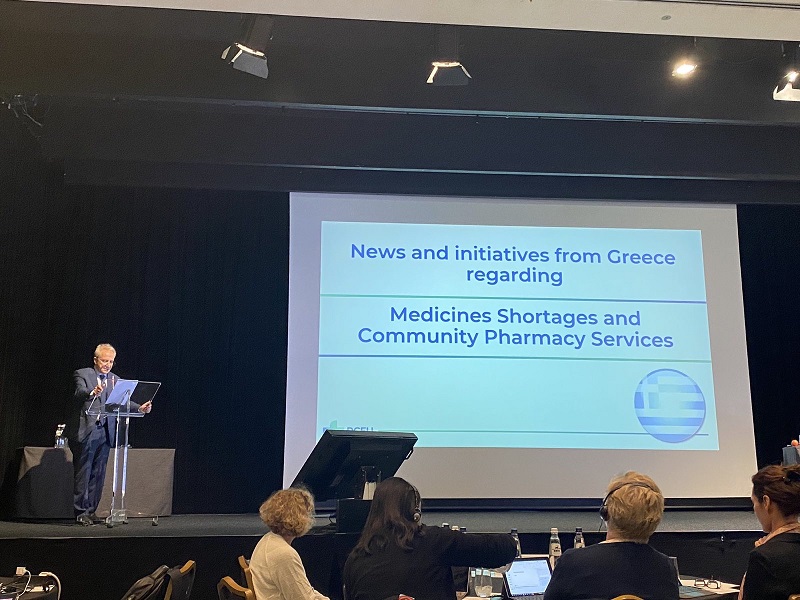
The biggest problem of pharmacists for 10 years is the shortage of medicines. It affects more than 400 first-line drugs of all therapeutic categories and endangers the treatment of patients, while it forces pharmacies to consume dozens of working hours, disrupting their operation.
This was emphasized by the president of the Panhellenic Pharmaceutical Association (PFS), Apostolos Valtas, during his intervention at the General Assembly of the Pan-European Pharmacists’ Organization (PGEU), speaking about the issue of drug shortages.
“We are asking for the tightening of measures such as the ban on exports for cases like Greece, where the shortages do not occur in medicines that have a production problem due to a lack of raw materials, but in the unrestrained speculation, in the context of the ill-conceived “business”, which results at the expense of Greek patients,” said Mr. Valtas.
Lack of medicines
He even emphasized that he is unable to fulfill his role as a health professional, as “The biggest problem of the Greek pharmacist that affects everyday life and the finances and in fact the viability of the Greek pharmacy for 10 years, is the problem of shortages. This problem is perennial and multifactorial and concerns more than 400 first-line, innovative drugs, across the spectrum of therapeutic categories and diseases, inconveniencing the insured and jeopardizing their treatment, while at the same time forcing pharmacies to consume dozens of working hours every day to dealing with it, by deregulating their operation”.
At another point in his intervention, Mr. Valtas emphasized how “Due to the closed budget, the result is that we have the cheapest medicines in the European Union, which unfortunately leads to the following situation:
The pharmaceutical companies that import drugs into Greece limit their quantities, since it is not economically advantageous for them to have unlimited quantities available in country since European markets are more expensive than Greece.
The domestic pharmacies that supply the pharmacies prefer, since the profit they have on prescription drugs is only 4.7% when they are available in the Greek pharmacy, to export them to countries of the European Union where their profit reaches up to 200%.
Of course, the situation becomes even more complicated, if one takes into account that the multinational pharmaceutical companies find in pharmacies of foreign countries, the pharmaceutical preparations they made available on the Greek market, and because of the financial loss they are suffering, further reduce the quantities on the Greek market”.
The proposals of the PFS
He then made extensive reference to the proposals submitted by P.F.S. in the State and are the following:
An indefinite ban on parallel exports of medicines for which shortages are recorded and this because it has been established in practice that only when the decisions banning exports are valid, the market gradually normalizes.
- On the contrary, when the measures are not permanent but temporary in nature, the pharmaceutical warehouses store them, without making them available on the Greek market, and then export them en masse.
- Change in Greek legislation, prohibiting sales between wholesalers beyond a normal percentage, in order to limit the exchange of pharmaceutical preparations for the purpose of exporting them. It is not possible for 80% of a wholesaler’s turnover to be sales to another wholesaler.
- There should be a real-time application of information on what exports each wholesaler carries out, so that everyone, the state, the pharmaceutical company and us pharmacists, know what each wholesaler exports.
- Strengthening and tightening of the institutional framework for the operation of wholesalers.
- Control by the Government of the proper operation of the entire supply chain, that is to Marketing Authorization Holders to wholesalers, to pharmacies and strict application of the laws and measures that it has decided.
- Strengthening the possibility of pharmacies to create, in cooperation with the state, an alert of a possible shortage of the pharmaceutical product. The National Medicines Organization and the Panhellenic Pharmaceutical Association should work together to create an electronic application with which the doctor will be informed about the medicine that is in short supply, when prescribing.
- Strengthening the ability of pharmacists in therapeutic substitution.
- Mandatory electronic prescription of drugs in short supply.
- Highlighting and analyzing the problem in the mass media, with interventions, interviews and reports
Actions
Mr. Valtas also referred to the actions of the Panhellenic Pharmaceutical Association, with the creation of three television spots that highlight the huge problem of shortages, with the aim of raising awareness among citizens and highlighting the difficulties in the daily work of pharmacists.
At the same time, he noted that the PFS took the initiative to call an emergency meeting with all the involved bodies in the presence of the Minister of Health, “because this situation cannot continue and decisions should be made, with clear targeting. We have asked for the creation of a permanent committee to deal with drug shortages.”
Concluding, Mr. Valtas pointed out that the PFS supports the measures to address the deficiencies provided for by the reform of the EU pharmaceutical legislation, pointing out that: “The recent announcements of the E.U. in May for the reform of the pharmaceutical legislation, but also the 10 Guidelines of the E.M.A. as they were formulated to address the problem of shortages, they are in the direction of the already formulated positions of the Panhellenic Pharmaceutical Association and some of the measures taken by the Greek government, and this makes us particularly happy. Obviously, the recent engagement of the EU and of the European Medical Association demonstrates the seriousness of the problem. The key words in this promising set of proposals for the future are equal patient access to medicines, increasing transparency and control for shortages, but also strengthening innovation and competitiveness for the European pharmaceutical industry.”
Latest News

WTTC: Travel & Tourism to Create 4.5M New Jobs in EU by 2035
This year, international visitor spending is set to reach 573 billion euros, up by more than 11% year-on-year

IMF: US Tariffs Shake Global Economy, Outlook Downbeat
IMF slashes global growth forecast to 2.8% as U.S. tariffs create uncertainty and ‘negative supply shock

First Step Towards New Audiovisual Industry Hub in Drama
The project is set to contribute to the further development of Greece’s film industry and establish Drama as an audiovisual hub in the region

Airbnb Greece – Initial CoS Ruling Deems Tax Circular Unlawful
The case reached the Council of State following annulment applications filed by the Panhellenic Federation of Property Owners (POMIDA)

Mitsotakis Unveils €1 Billion Plan for Housing, Pensioners, Public investments
Greek Prime Minister Kyriakos Mitsotakis has announced a new set of economic support measures, worth 1 billion euros, aiming to provide financial relief to citizens.

Alter Ego Ventures Invests in Pioneering Gaming Company ‘Couch Heroes’
Alter Ego Ventures' participation in the share capital of Couch Heroes marks yet another investment by the Alter Ego Media Group in innovative companies with a focus on technology.

Corruption Still Plagues Greece’s Driving Tests
While traffic accidents continue to claim lives on Greek roads daily, irregularities and under-the-table dealings in the training and testing of new drivers remain disturbingly widespread

Pope Francis Died of Stroke and Heart Failure Vatican Confirms
As news of the official cause of death spread, tributes poured in from across the globe. The 1.4 billion-member Catholic Church is united in grief, remembering a pope who championed inclusion, justice, and compassion

Increase in Both Museum Visits, Revenues for 2024
As expected, the Acropolis was the top archeological site in the country, followed by Sounion, Mycenae, the ancient theater of Epidaurus, and Vergina in northern Greece

Where Greece’s Tourists Come From: A Look at 2025’s Top Visitor Markets
The United Kingdom continues to hold the top spot as the largest source of incoming tourism, with 5.6 million seats booked for Greece this summer — up 2.2% from last year. This accounts for 20% of all international air traffic to Greece












![Πλημμύρες: Σημειώθηκαν σε επίπεδα ρεκόρ στην Ευρώπη το 2024 [γράφημα]](https://www.ot.gr/wp-content/uploads/2025/04/FLOOD_HUNGRY-90x90.jpg)



![Ξενοδοχεία: Μεγάλο το ενδιαφέρον για επενδύσεις στην Ελλάδα – Η θέση της Αθήνας [γραφήματα]](https://www.ot.gr/wp-content/uploads/2025/03/Athens-hotels-90x90.jpg)
























 Αριθμός Πιστοποίησης
Αριθμός Πιστοποίησης